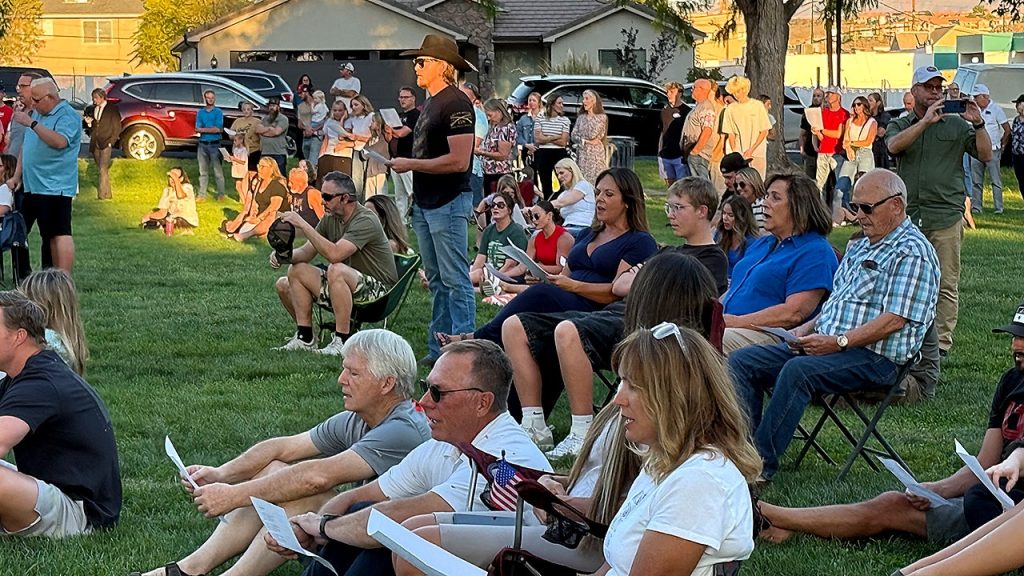Community Unites in Grief and Solidarity After Charlie Kirk’s Tragic Death
In a powerful display of community resilience, hundreds gathered Sunday evening in the Utah hometown of alleged gunman Tyler Robinson to honor Charlie Kirk, mourn collectively, and acknowledge the pain felt by all families affected by this tragedy. The vigil, held in an atmosphere of somber reflection, transcended political divisions as organizer Jordan Hess addressed the crowd with visible emotion. “I’m grateful that everyone felt the desire and the need to be here in the spirit of community tonight,” Hess said, his voice catching as he welcomed attendees who had come together not as political adversaries but as fellow Americans united in grief. This gathering represented more than a memorial—it symbolized a community’s determination to preserve civil dialogue in the face of violence and division.
The vigil’s purpose extended beyond mourning Kirk’s death to affirming the values that underpin American democracy. Hess articulated this beautifully, noting they had gathered “to celebrate who we are as Americans – and to mourn… not as Democrats or Republicans, not as left or right, not as different races or believers of different religions but as citizens of the greatest, most enduring experiment of self-government that the world has ever known.” In acknowledging the multifaceted nature of their collective grief, Hess recognized they were mourning not only for Kirk and his family but also for Robinson’s family, the traumatized student witnesses, and for what this tragedy might say about the state of the nation. The message was clear: regardless of political alignment, Kirk was “an American, a citizen, a son, a husband and maybe most importantly a voice” who courageously advocated for his beliefs in “faith, family and freedom.”
For many attendees, the vigil represented a stand for free expression and against political violence. Taylor Crosby explained his presence in stark terms: “The recent attack on free speech is something that should motivate the entire country to come together because when we can’t speak our mind, that’s the death of democracy.” Though Crosby acknowledged he didn’t align with all of Kirk’s views, he respected Kirk’s conviction and advocacy. His comments reflected a concern shared by many present—that political differences have become so toxic in some circles that disagreement leads to demonization rather than dialogue. This sentiment was echoed throughout the gathering, with participants repeatedly emphasizing that while vigorous debate is essential to democracy, violence represents the abandonment of democratic principles. The community’s response demonstrated a determination to resist this trend, insisting that Americans can “disagree passionately without destroying one another.”
Jesse Wilkinson, a part-time firefighter wearing a shirt emblazoned with “Freedom,” embodied the personal dimension of the community’s response. Having grown up in St. George before moving to Washington, Utah, his presence transcended politics. “I just wanted to support my community,” he explained. “I know we’re going through a hard time with the alleged shooter being from here and everything… I just wanted to be supportive and share my love and support for all those that are mourning, especially the Kirk family as well as the Robinson family.” For Wilkinson, Kirk represented more than political ideology—he was “an amazing man… having an amazing impact” whose “voice will echo forever.” His perspective framed the tragedy as an assault not just on an individual but on the freedoms Kirk championed. Even Wilkinson’s choice of attire carried symbolic weight, a subtle nod to Kirk’s style and the values of freedom that underpin American democracy.
The vigil also served as a space for community members to articulate their vision for healing and moving forward. Kevin Holyoak spoke of the evening as a time for reflection, urging people to respect differing beliefs and “talk through things as opposed to taking measures into your own hands that harm somebody else.” As an admirer of Kirk, Holyoak appreciated how the activist “listened to opposing opinions, treated people with respect, and encouraged open conversation,” suggesting these qualities should be universally emulated. This sentiment was amplified by Utah Tech University President Shane Smeed, who spoke personally rather than in his official capacity. Smeed characterized the week as “incredibly difficult” and “tragic,” urging the community to “lean on faith instead of fear.” His metaphor of Canadian geese flying in formation illustrated how communities support one another, especially when someone struggles—a poignant image of the unity needed in times of crisis.
Throughout the evening, participants consistently returned to themes of dialogue, compassion, and the rejection of violence as a response to ideological differences. Hess powerfully observed that “political assassination is not just the taking of life, it is the attempted murder of dialogue,” while Wilkinson warned that “if we’re silent, that’s what’s going to cause violence. We need to come together, we need to talk, and agree to disagree.” President Smeed concluded the gathering with a prayer for peace, emphasizing that healing would come only through choosing connection over division. In this small Utah community touched by national tragedy, the vigil accomplished something remarkable—it transformed a moment of profound loss into an affirmation of shared humanity and democratic values. As the hundreds who gathered dispersed into the night, they carried with them not just grief for Charlie Kirk, but a renewed commitment to preserve the civil discourse and mutual respect that form the foundation of American society. Their message reached beyond political lines: in a nation increasingly defined by its divisions, the path forward must be paved with dialogue rather than destruction.


